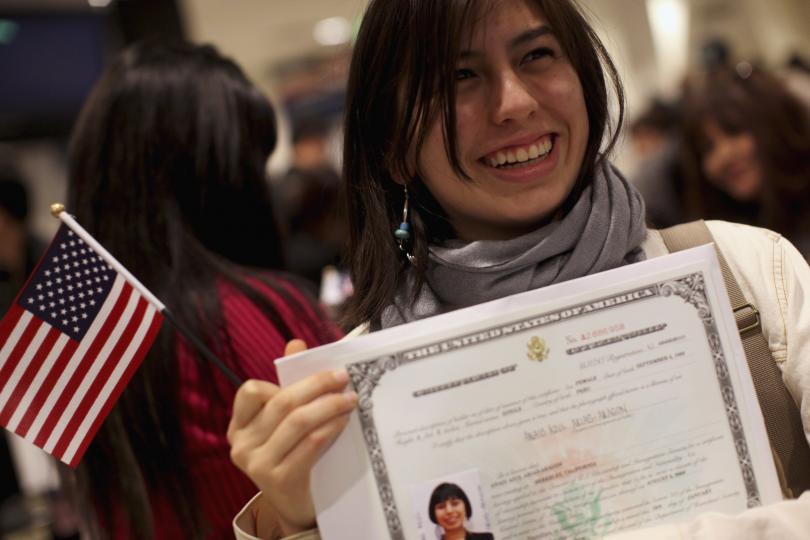The process of obtaining U.S. citizenship is a significant and life-altering endeavour that embodies the hopes and aspirations of innumerable immigrants enthusiastic about investigating various ways to become a U.S. citizen. Specifically crafted to satisfy the intellectual inquisitors, this exhaustive manual explores the complexities associated with the four principal routes to citizenship—naturalisation, military service, parental ties, and marriage. Every possible path reveals a distinct array of prerequisites, obstacles, and benefits, forming the varied accounts of individuals endeavouring to establish residency in the United States. Along these discrete trajectories, the guide shall illuminate the complex intricacies and subtleties, furnishing an all-encompassing synopsis for individuals pondering their odyssey towards U.S. citizenship and investigating alternative ways to become a U.S. citizen.
Citizenship Through Naturalization
Overview: The standard length of perpetual residency following naturalisation is five years; however, matrimony to a U.S. citizen reduces this period to three years. Engaging in this pathway signifies compliance with the law and a demonstration of one’s determination to actively and knowledgeablely participate in American society.
Eligibility Criteria: Applicants must comprehensively comprehend the U.S. government and history and the essential prerequisites. Specific elements include language proficiency, moral character, and residency information. Special provisions are in place to accommodate the needs of individuals with disabilities throughout the application process, along with reasonable accommodations.
Application Process: The extensive procedure consists of submitting Form N-400, passing a citizenship examination and interview, and taking the solemn Oath of Allegiance. In addition, individuals with specific eligibility criteria may be eligible for exemptions and waivers, which promote inclusivity throughout acquiring citizenship.
Citizenship Test Preparation: Many resources are accessible to aid candidates in their readiness for the citizenship examination, encompassing online courses and study materials. Having a comprehensive understanding of the test’s structure and material increases the likelihood of achieving success.
Citizenship Through Marriage
Simplified Process: The streamlined citizenship process resulting from matrimonial unions with U.S. citizens signifies the government’s acknowledgement of familial bonds. The unique considerations introduced by the three-year marriage requirement, green card possession, and residency consistency underscore the significance of a stable and authentic marital union.
Application Process: Commencing their voyage with Form N-400, couples confront the complex terrain of a marriage interview, a critical juncture in ascertaining the genuineness of the union. By inquiring about daily life, shared responsibilities, and future intentions, the interview procedure guarantees the validity of the marriage.
Conditional Permanent Residence: When the marriage is less than two years old at the time of confirmation, it is possible to be granted conditional permanent residence. A joint petition to remove conditions is mandatory after two years, which is evidence of the government’s dedication to preventing fraudulent marriages.
Marriage Fraud Prevention: In collaboration with law enforcement agencies, the government conducts site visits, interviews with neighbours and acquaintances, and other measures to prevent marriage fraud. This rigorous methodology aims to maintain the credibility of the immigration system.
Citizenship Through Parents
By Birth: The criterion for citizenship by birth differs regardless of whether it occurs in the United States or abroad to parents who are citizens of the United States. The dynamic terrain considers variables, including residency, birth dates, and parentage. Parents must demonstrate their U.S. citizenship and fulfil particular criteria contingent upon their child’s date of birth.
Adoption: Adopted children acquire citizenship from their U.S. citizen adoptive parents under certain conditions; this demonstrates the inclusive nature of U.S. immigration policies. By establishing legal and physical custody, the procedure ensures the adopted child’s welfare.
Derivative Citizenship: The automatic issuance of citizenship to confident children by their parents obviates the necessity of submitting an individual application. Parents wishing their offspring to obtain citizenship must thoroughly understand these provisions.
Documentation Requirements: Every route to obtaining citizenship via parental means necessitates thorough documentation, such as birth certificates, legal custody verification, and proof that the parents are citizens of the United States. Successfully meeting these requirements necessitates meticulous preparation and a keen eye for detail.
Citizenship Through Military Service
Special Provisions: Engaging in military service is a virtuous vocation, characterised by accelerated schedules in conflict or tranquillity. Noncitizens who meritoriously serve their country and demonstrate unwavering allegiance to American values may be eligible to apply for naturalisation without the conventional residency prerequisites.
Requirements: By adhering to the values of honesty, competence in the English language, and a fundamental comprehension of American politics and history, military service provides a unique pathway to obtaining citizenship. The special provisions designed to recognise and appreciate the service and contribution of military personnel to preserve national security are in place.
Naturalisation During Peacetime: The criteria for individuals serving during peacetime periods vary, emphasising honourable conduct, minimal duration of active duty, and application submission either while in service or within six months of separation. This pathway signifies the government’s recognition of the varied conditions individuals may encounter while serving in the military.
Navigating the Application Process
Standard Requirements: Irrespective of the selected route, the journey requires essential preconditions, including impeccable ethical standards, fluency in English, and strict adherence to residency regulations. Potential candidates must pass a comprehensive background investigation to verify adherence to U.S. legislation.
Professional Assistance: Considering the complexities inherent in the application procedure, it is crucial to obtain the advice of a professional. The counsel of immigration attorneys and accredited representatives can be of great value in advising applicants, guaranteeing their adept navigation of the system, and preventing possible drawbacks.
Interview Preparation: Critical, the interview phase of the application process inquires regarding the candidate’s history, background, and compliance with United States legislation. Optimal preparation, consisting of simulated interviews, can bolster the applicant’s confidence and preparedness.
U.S. Citizenship Tests
English Test: A comprehensive evaluation of language proficiency, encompassing speaking, reading, and writing, is integral to the immigration interview process. Applicants are required to exhibit proficiency in fundamental conversational skills, oral reading, and written sentence construction.
Civics Test: The civics examination, consisting of one hundred inquiries about the U.S. government and history, emphasises the importance of a comprehensive comprehension of American principles. To exhibit dedication to civic knowledge, candidates must respond accurately to a predetermined set of inquiries.
Study Resources: Citizenship and Immigration Services (USCIS) of the United States offers extensive study materials, including official practice exams, study guides, and educational materials. Candidates can better prepare for the civics and English examinations using these resources.
Duration of the Journey
Varied Timelines: The timing of citizenship acquisition demonstrates a spectrum, with external factors, the complexity of the application process, and the selected pathway all exerting an influence. Although expedited pathways may lead to a reduced duration, specific circumstances, including delays in processing and background checks, can prolong the overall period.
Proactive Approach: It is crucial to commence the voyage in advance, recognising that potential setbacks and accumulations of work could affect the overall schedule. Applicants should maintain awareness of processing times, submit their applications promptly, and exercise patience while waiting.
Conclusion
A unified conclusion arises from the convergence of various narratives: the endeavour to obtain U.S. citizenship is a transformative and multifaceted journey that embodies the fundamental principles of the American ideal and demonstrates many ways to become a citizen. The tenacity, ambitions, and perseverance of immigrants, who enrich the fabric of American society, reside beyond the bureaucratic procedures. Every individual who embarks on this journey demonstrates a deep dedication to the principles and values that define the United States of America, whether they are pursuing naturalisation, navigating the complexities of parental responsibilities, entering into matrimony, or serving in the military. The narratives of individuals undertaking the momentous and consequential process of becoming U.S. citizens will continue to evolve with the nation. These narratives will encompass a wide range of ways to become U.S. citizens.




